Speakers and Abstracts
(Speakers are listed in the order of the programs’ sessions)
Lecture 1: Updates on Antifungals Treatments of Neutropenic Fever

Rima Moghnie, MD
Dr. Rima Moghnie, an infectious disease specialist and researcher, has practiced medicine in Lebanon since 1996. She has an extensive experience in treating immunocompromised patients in the field of hematology, oncology and hematopoietic stem cell transplantation at multiple tertiary-care hospitals for more than 20 years as well as in general infectious diseases clinical practice for more than 25 years. She held leadership roles in Infection Prevention and Control (IPC) and Antimicrobial Stewardship (AMS) in several tertiary-care hospitals. Currently, she serves as Professor of Clinical Medicine at the Lebanese American University, also heading the Division of Infectious Diseases at the university’s medical center. As former president of the Lebanese Society for Infectious Diseases and Clinical Microbiology, her dedication to enhancing IPC practices in Lebanon spans since 2011, focusing on hand hygiene, antimicrobial resistance (AMR), and AMS. Since 2018, she has been a part-time consultant for the WHO, developing National Action Plans for AMR control in several Middle Eastern countries, including Lebanon, Syria, Kuwait, Libya, Tunisia and Somalia and UAE. Additionally, she acted as an external consultant for WHO, aiding in developing national IPC guidelines in countries like Lebanon, Iraq, Palestine, and Jordan. Dr. Moghnieh has co-authored over 50 publications in reputable journals, notably contributing to national clinical guidelines for managing community-acquired pneumonia, febrile neutropenia, urinary tract infections, and complicated intra-abdominal infections. Her research interests encompass various fields of infectious diseases, including epidemiological studies, AMR surveillance, hospital-based IPC and AMS, and COVID-19 vaccinology. As an educator, Dr. Moghnieh has provided strong clinical mentorship to fellows, residents and medical students rotating through tertiary care hospitals she has worked in from multiple reputed medical schools in Lebanon.
Abstract
Empiric antifungal therapy is widely regarded as the standard of care for high-risk neutropenic patients presenting with persistent fever. The role of a preemptive, diagnostic-driven approach, utilizing tools such as galactomannan screening and chest computed tomography scans, in improving survival and reducing the risk of invasive fungal disease (IFD) during the early phase of neutropenia remains an area of ongoing investigation. In patients with conditions like acute myeloid leukemia (AML), myelodysplastic syndrome (MDS), and allogeneic hematopoietic cell transplant recipients, recent studies have explored alternative antifungal strategies, such as preemptive treatment, to reduce unnecessary antifungal use without compromising patient outcomes. These strategies aim to identify patients at high risk of IFD early, reducing exposure to antifungals while maintaining efficacy. This session will review the latest updates in antifungal treatment strategies for neutropenic fever, focusing on the balance between effective therapy, safety, and the potential benefits of diagnostic-driven preemptive approaches.
Lecture 2: What’s New in AML Young and Fit Patients
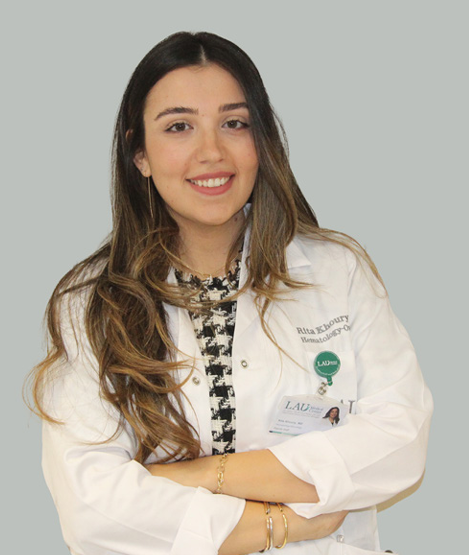
Rita El Khoury, MD
Dr. Rita Khoury serves as an Assistant Professor of Clinical Medicine at the Department of Internal Medicine, with a specialization in Hematology-Oncology, at the LAU Medical Center-Rizk Hospital. She obtained her Doctor of Medicine (MD) degree from the Lebanese American University (LAU). Dr. Khoury completed a three-year residency in Internal Medicine and a three-year fellowship in Hematology-Oncology at LAU Medical Center-Rizk Hospital. She further enhanced her expertise through a one-year fellowship at the Gustave Roussy Institute in Villejuif, France.
In addition to her clinical and academic roles, Dr. Khoury is actively engaged in research, having co-authored over 25 peer-reviewed publications. She regularly contributes to the medical community by participating in international conferences and advanced medical courses.
Abstract
In the era of personalized medicine, risk assessment is a cornerstone in the management of acute myeloid leukemia (AML). Integrating baseline clinical and biological characteristics on a case-by-case basis is crucial not only for selecting the most effective induction therapy to achieve complete remission but also for tailoring subsequent treatment strategies. For young, high-risk AML patients with low comorbidity burden and good overall condition (“fit” patients), intensive chemotherapy followed by allogeneic stem cell transplantation remains the standard approach. However, the treatment landscape is rapidly evolving with the introduction of novel targeted agents in induction, consolidation, and maintenance settings. These advancements are reshaping treatment algorithms for patients eligible for intensive chemotherapy. This presentation will address key challenges in identifying and managing high-risk AML, offering practical insights to optimize clinical decision-making in this dynamic field.
Lecture 3: The Exciting Journey of CLL from Bench to Bedside
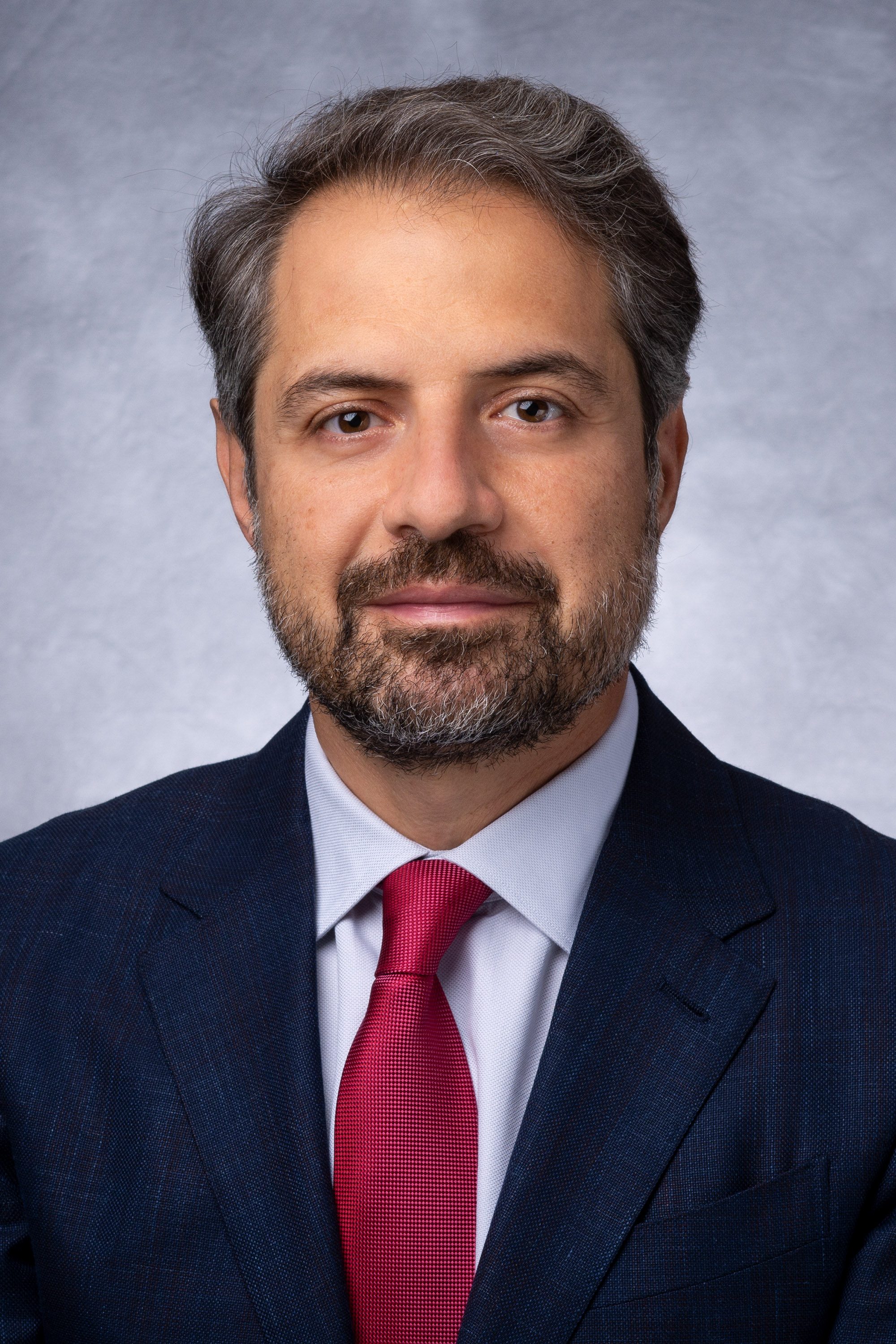
Elias Jabbour, MD
Dr. Elias Jabbour is a Professor of Medicine in the Department of Leukemia at The University of Texas MD Anderson Cancer Center (MDACC) in Houston, Texas. He earned his Doctor of Medicine (MD) degree from the Saint Joseph University School of Medicine in Beirut and completed his residency at Hôtel-Dieu de France University Hospital. He subsequently pursued a fellowship in Hematology-Oncology at the Gustave Roussy Institute in France.
In 2003, Dr. Jabbour joined MDACC as a fellow in the Department of Hematology, Leukemia, and Stem Cell Transplantation. He later became a faculty member in the Department of Leukemia, initially as an Assistant Professor, before advancing in his academic career.
Dr. Jabbour plays an active role in the medical and scientific community, frequently participating in international scientific meetings. He has authored or co-authored over 550 peer-reviewed publications and abstracts and serves as a reviewer for numerous scientific journals.
Abstract
Over the past decade, significant advancements in the understanding of chronic lymphocytic leukemia (CLL) biology have led to the development of novel targeted therapies, transforming the treatment landscape. Randomized clinical trials have demonstrated superior progression-free and overall survival with targeted agents compared to traditional chemoimmunotherapy, limiting its role in current CLL management. Bruton tyrosine kinase (BTK) inhibitors, BCL-2 inhibitors, and CD20 monoclonal antibodies have become key treatment options across both frontline and relapsed/refractory settings. Ongoing phase 3 trials are evaluating novel combinations of targeted therapies, with the potential to further redefine first-line treatment strategies. Meanwhile, emerging approaches such as non-covalent BTK inhibitors, chimeric antigen receptor (CAR) T-cell therapy, and other innovative strategies are being explored, particularly in relapsed disease. Notably, some of these therapies are now being investigated in earlier treatment lines, potentially reshaping the future of CLL management. This keynote presentation will highlight the exciting progress in CLL treatment, from foundational discoveries to groundbreaking clinical applications.
Lecture 4: Gathering-Meet the Experts-Networking

Elias Jabbour, MD
Abstract
The growing interest in networks of interactions within healthcare is driven by the belief that these networks can enhance the quality and efficiency of healthcare delivery systems. However, most supporting evidence remains descriptive, with limited systematic evaluation of the outcomes of network interventions in healthcare settings. Despite the increasing application of Social Network Analysis (SNA) tools, there is still a lack of understanding regarding how intervention programs that aim to alter social interaction patterns among healthcare providers impact service delivery quality. In this session, we will explore the reasons behind this gap, the challenges faced, and the key components necessary for developing a successful network intervention plan. Future research must focus on assessing the long-term impact of SNA on healthcare practices, policies, and behaviors, providing evidence of how these changes improve patient outcomes and overall service quality.
Lecture 5: Is there a Role for Stem Cell Transplantation in Multiple Myeloma Treatment?
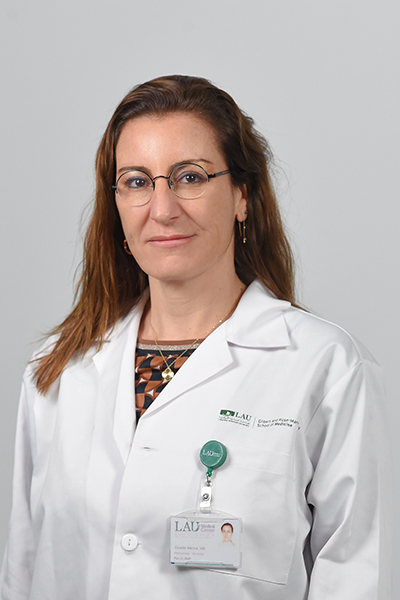
Colette Hanna, MD
Dr. Colette Hanna earned her medical degree from Saint Joseph University and Paris VII. She completed her training in Internal Medicine and Hematology-Oncology at Saint Joseph University - Hôtel-Dieu de France and the Gustave Roussy Institute in France, with a specialized focus on bone marrow transplantation and malignant hematology.
Since 2009, Dr. Hanna has been practicing in Lebanon, specializing in hematological malignancies and autologous bone marrow transplantation. She remains dedicated to advancing patient care in these fields through clinical practice and ongoing professional development
Abstract
Autologous hematopoietic stem cell transplantation (ASCT) has long been a cornerstone in the treatment of multiple myeloma (MM), providing significant survival benefits, particularly in eligible patients. However, the landscape of MM therapy has evolved dramatically with the advent of novel agents, including proteasome inhibitors, immunomodulatory drugs, and monoclonal antibodies, as well as the emergence of chimeric antigen receptor (CAR) T-cell therapy and bispecific antibodies. These advancements have led to improved response rates and prolonged survival, raising the question of whether ASCT remains essential in the era of modern therapeutics. While novel therapies offer promising outcomes, ASCT continues to play a crucial role in achieving deep and durable remissions, especially when incorporated into a comprehensive treatment strategy. Ongoing clinical trials are assessing the optimal sequencing of ASCT with novel therapies to maximize patient benefit.
Lecture 6: How I treat ALL: The Specific Situation of the Lebanese Patient

Elias Jabbour, MD
Abstract
Acute lymphoblastic leukemia (ALL) is the most common pediatric malignancy, accounting for approximately 25% of all childhood cancers, with a particularly high burden in developing countries. In Lebanon, ALL poses a significant public health challenge. This session will provide valuable insights into the management and outcomes of childhood ALL in Lebanon, presenting a realistic overview that may inform the development of national treatment guidelines and improve the investigation and management of pediatric ALL in the region.
Lecture 7: What’s New in CML?
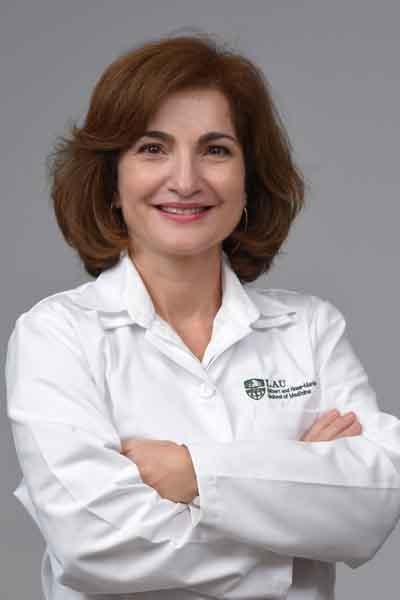
Christina Khater, MD
Dr. Christina Khater is an American Board certified Hematologist and Oncologist, and a Clinical Assistant Professor of Hematology and Oncology at the LAU Gilbert and Rose-Marie Chagoury School of Medicine and LAU Medical Center-Rizk Hospital.
She obtained her M.D. degree from St. Joseph University (Beirut). She then pursued a three-year residency training in Internal Medicine at Cooper Hospital (Camden, NJ). She completed a three-year fellowship in Hematology and Oncology at Temple University (Philadelphia, PA) and Fox Chase Cancer Center (Philadelphia, PA). She obtained her three Boards (Internal Medicine, Hematology and Oncology) with high scores.
She is the Program Director of the Hematology-Oncology Fellowship at LAU Medical Center-Rizk Hospital, and a full-time faculty member and practicing physician in the the Hematology-Oncology Division of the medical center; furthermore she is involved in academic teaching at the LAU Gilbert and Rose-Marie Chagoury School of Medicine.
Dr. Khater has extensive clinical experience in the management of a wide range of solid tumors, including breast cancer, gynecologic cancers, lung cancer and gastrointestinal cancers. She has a special interest in breast cancer and is an active member of a foundation that helps women with this disease.
She dedicates time and attention to her patients, in all aspects of their care, including their physical and emotional well-being. She practices Oncology with empathy and compassion, offering her patients state-of-the art treatments with a humane approach.
Abstract
Chronic myeloid leukemia (CML) is a myeloproliferative disorder caused by a genetic translocation known as the Philadelphia chromosome, leading to the BCR:ABL1 fusion oncogene. Four tyrosine kinase inhibitors (TKIs)—imatinib, dasatinib, bosutinib, and nilotinib—are approved for first-line treatment, with second- and third-generation TKIs offering deeper and faster responses, though no significant survival advantage. For patients who fail frontline therapy, second- and third-generation TKIs are used based on individual disease characteristics. The T315I mutation confers resistance to most TKIs, with ponatinib and other newer agents offering alternative options. Allogeneic stem cell transplantation remains important for patients with resistance or advanced-phase disease. Long-term survival can be achieved by continuing effective TKIs with or without additional therapies. This session will explore the latest advancements in CML treatment and management strategies.
Lecture 8: How I Treat Elderly AML Patients
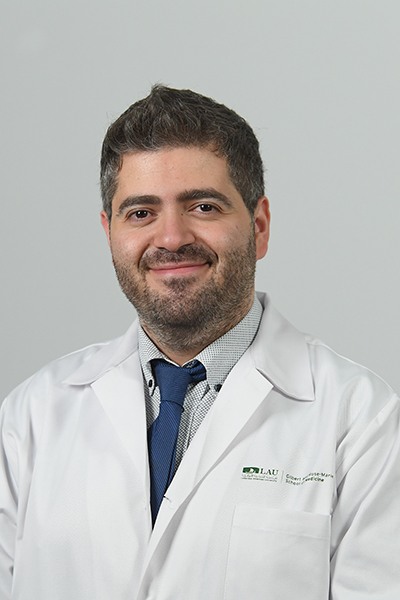
Annoir Shayya, MD
Dr. Annoir Shayya is currently a clinical instructor at the LAU Gilbert and Rose-Marie Chagoury School of Medicine. Dr. Shayya obtained a Medical Degree from the Gilbert and Rose-Marie Chagoury School of Medicine in 2015, followed by the completion of an Internal Medicine degree in June 2018 and then fellowship in hematology and oncology. Dr. Shayya is a strong patient advocate interested in personalized evidence based medicine.
Abstract
Geriatric assessments and genetic data play a crucial role in guiding the treatment of elderly patients with acute myeloid leukemia (AML). Over the past decade, the FDA has approved at least nine new targeted therapies, predominantly small molecule inhibitors, for AML patients across all age groups. These agents offer novel therapeutic options for older patients, a population that is often poorly chemo-tolerant and whose AML is typically resistant to traditional chemotherapy. With these new treatments, older AML patients can now receive less toxic therapies that provide comparable, if not superior, efficacy to conventional chemotherapy. Despite challenges such as TP53 mutant AML, emerging therapies on the horizon offer promising potential to improve outcomes for elderly AML patients.
Lecture 9: The Role of Nutritional Support in Hematologic Cancer Care

Christina Khater, MD
Dina Motran, RN
Sandra Akiki, MSc, LD
Abstract
Onco-hematological diseases, including lymphoma and leukemia, are increasingly diagnosed globally. Both the disease itself and the associated treatments can significantly impact the nutritional status of patients. Malnutrition is common among individuals with hematologic malignancies and can adversely affect disease progression, treatment efficacy, and quality of life. A multidisciplinary approach, coupled with systematic and protocol-driven nutritional assessments, is crucial for the effective management of these patients. This presentation focuses on the role of nutritional support in onco-hematological patients.
Lecture 10: The Cure of ALL, in Our Lifetime?

Elias Jabbour, MD
Abstract
Recent advances in the treatment of childhood acute lymphoblastic leukemia (ALL) have raised important questions about when a cure can be confidently declared. With improved therapies and more refined treatment protocols, the long-term outcomes for patients completing treatment have significantly improved. The overall survival and event-free survival rates have steadily increased over the years, with current treatments achieving higher remission rates and reducing the risk of relapse or development of second neoplasms. The omission of prophylactic cranial irradiation in recent treatment regimens has contributed to lower relapse rates, with a significant proportion of patients remaining relapse-free after years of treatment completion. The most critical predictor of outcome post-treatment is the type of therapy used. Based on current evidence, it is now believed that patients who remain in remission for four years after completing therapy may be considered cured, with a less than 1% chance of relapse. These findings offer a hopeful outlook for the future of ALL treatment, suggesting that we may be approaching a time when ALL can be cured with a high degree of certainty.
Lecture 11: What’s New in the Treatment of MDS?
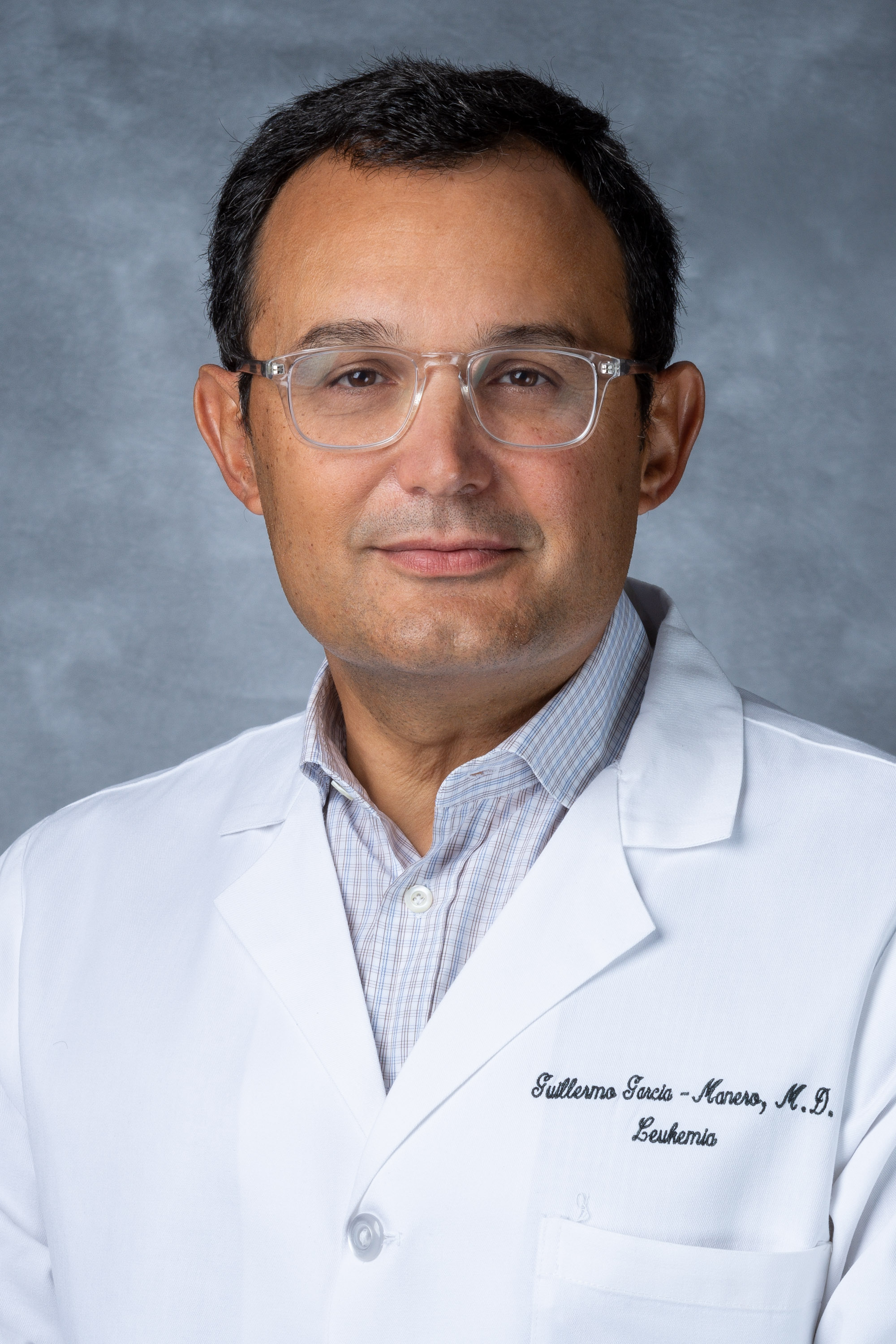
Guillermo Garcia-Manero, MD
Dr. Guillermo Garcia-Manero is a Professor in the Department of Leukemia and the Chief of the Section of Myelodysplastic Syndromes at The University of Texas MD Anderson Cancer Center (MDACC) in Houston, Texas. He earned his Doctor of Medicine (MD) degree from the University of Zaragoza, School of Medicine, in Zaragoza, Spain. He subsequently completed a clinical internship and residency in Internal Medicine, followed by a clinical fellowship in Hematology and Medical Oncology at Thomas Jefferson University Hospital in Philadelphia, Pennsylvania.
Dr. Garcia-Manero leads the world’s largest Myelodysplastic Syndromes (MDS) program and directs the MDS/Acute Myeloid Leukemia (AML) Moon Shot® program at MD Anderson. His research focuses on elucidating the pathophysiology of these disorders and developing novel therapeutic approaches, contributing to over 800 publications and numerous clinical trials aimed at advancing treatment strategies in the field.
Abstract
Myelodysplastic syndromes (MDS) are a diverse group of clonal hematopoietic stem cell disorders characterized by myeloid dysplasia, peripheral blood cytopenias, and an increased risk of progression to acute myeloid leukemia (AML). While hypomethylating agents (HMAs) are the standard of care for patients with MDS, nearly 50% of patients fail to respond to this treatment. For those who experience treatment failure, prognosis is poor, and effective second-line therapies remain lacking, with clinical trials often being the only option for improving outcomes. Recent advances in the understanding of MDS pathogenesis have led to the development of new therapeutic agents targeting molecular alterations, regulators of cell death, signaling pathways, and immune regulatory proteins. These novel therapies aim to provide more effective treatments for patients who have failed HMA therapy. This session will explore the latest therapeutic options for MDS patients, focusing on the biological rationale behind the development of these emerging treatments and their potential to improve patient outcomes.